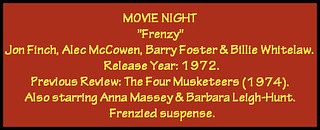Cast:
Ingrid Pitt (Marcilla/Carmilla/Mircalla Karnstein), Pippa Steel (Laura Spielsdorf), Madeline Smith (Emma Morton), Peter Cushing (General Spielsdorf), George Cole (Roger Morton), Dawn Addams (the Countess), Kate O'Mara (Mademoiselle Perrodot), Douglas Wilmer (Baron Joachim von Hartog), Jon Finch (Carl Ebhardt), Ferdy Mayne (The Doctor), Kirsten Lindholm (the First Vampire), and John Forbes-Robertson (the Man in Black) Directed by Roy Ward Baker (#1742 - The Legend of the 7 Golden Vampires. #2106 - Scars of Dracula, #2120 - The Vault of Horror)
Review:
Well, it was the dawn of the 1970s and therefore the dawn of trying to do something a bit different with vampire movies...The Vampire Lovers was the first of what is considered a "Karnstein Trilogy". All three films were produced by Hammer to go along with having a screenplay by Tudor Gates. Each had a different company responsible for getting it shown in the States, with this one being a co-production between Hammer and American International Pictures. The film uses the Gothic novella Carmilla (as serialized by Sheridan Le Fanu from 1871 to 1872; he died the following year), which involved a woman being prey to a female vampire that is later revealed be a Countess Karnstein. Harry Fine and Michael Style produced the film together and wrote the adaptation with Gates. Baker was once again directing a film (already noted for A Night to Remember (1958) and TV work) with Hammer after having done work for them with Quatermass and the Pit (1967), The Anniversary (1968), and Moon Zero Two (1969) It was the only one of the films to have AIP involved. The next two films of the trilogy were each released in 1971 with Lust for a Vampire (as directed by Jimmy Sangster with Yutte Stensgaard and Mike Raven as the new Karnsteins) and Twins of Evil (as directed by John Hough with Damien Thomas and Katya Wyeth as Karnsteins alongside the Collinson sisters)
Admittedly, one does get what they were looking for in leering power with as many bosoms as there are vampires. You have to love a movie that gives a warning on the poster that it is "Not for the mentally immature". It probably isn't as vaunted in devastating power of lurid sex and violence as one might wonder about, but it is a neat gem worth giving some interest for its craftsmanship in the long run. You get your melodrama that will build the inevitable in hunting and tombs and all that stuff that matters, albeit in a split format that gets you a head-chopping early before getting into the cyclical nature of a woman falling into the habit of being friendly with a young lady (first with Steel and then with Smith). Pitt went on to do other vampire-related films such as Countess Dracula (1971) to go along with dabbling in writing (such as Bedside Companion for Vampire Lovers). She had a clear view of how it felt to do films like these that works out here for alluring charm, one who plays it all much like a cat playing with the things around them (so not exactly in a carnal way). Smith probably plays it a bit too much like a deer in the headlights in innocence, but it does lend itself to some amusing moments when she and Pitt engage in play. You don't get as much of Cushing as you might wonder about, but I suppose not every vampire film with him needs to be him giving you exposition, though funny still to see him paired with Wilmer (who like Cushing played Sherlock Holmes), which works out fine. It's strange that there even is a "man in black" watching the proceedings at all to go along with nightmares of cats (vampires, cats, black-and-white, get it?). The vampire death gives you something different: stake to the chest and a head-chopping, although it probably is most striking to see a painting turn decrepit for that last shot. In general, it delivers allure in the gradual display of lurid entertainment you would expect in terms of appealing women and the patience to make the display of deja vu lady vampirism work out without seeming tired or out of its element.
Overall, I give it 8 out of 10 stars.




